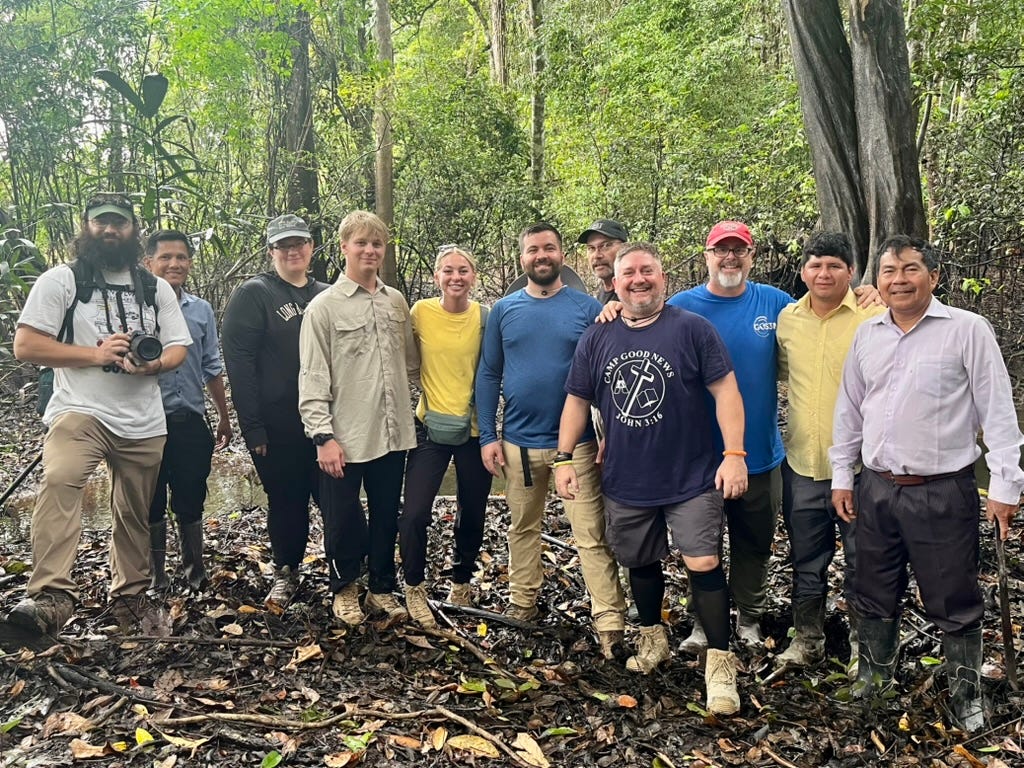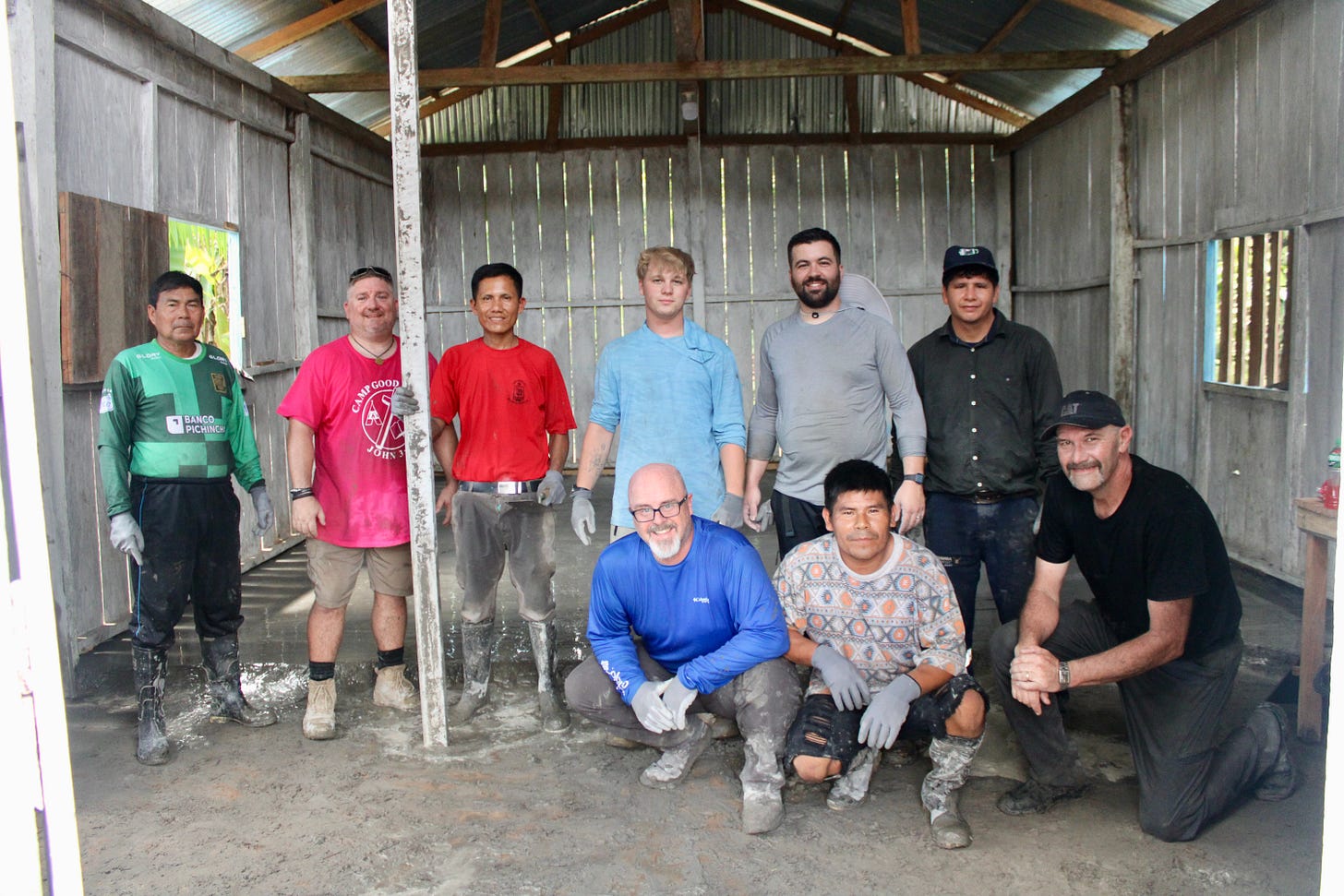What Peru Taught Me About the Urgency of Grace
Reflections from the mission field.
I’ve spent a lot of time recently mulling over what I would say about my recent mission trip to Peru and how I would say it. As you may know, my church sent a team of six, including me, to partner with GOS3M and their ministry efforts in Peru, specifically in Iquitos, Nauta, and Buenos Aires. Our days were full as we led or participated in worship services, hosted a three-day Bible school for kids, visited with the locals, told our salvation stories, and poured a concrete floor — by hand! — in the village church in Buenos Aires. There’s been a lot to process since arriving back in the states. This was the first time I’d ever been on a foreign mission trip, and, as you might expect, we witnessed a totally different way of life. Bamboo structures, thatched roofs, and dirt floors were the norm, just everyday life.
In Buenos Aires, which is where we spent most of our time, we were surrounded by dense jungle and the Marañón River, which feeds into the Amazon. This village is very remote, accessible only by boat, which is why it took two full days of travel to get there. With no formal “industry” to speak of, the locals rely on fishing or small-scale farming to survive. Although we saw a few satellite dishes neatly positioned on some of the roofs, electronic entertainment was limited, to say the least. The only electricity to speak of came via a generator that would run from 6 to 8 p.m. Needless to say, there wasn’t a lot of Netflix happening in Buenos Aires.
I say all that to say this: it would be very easy to come back from a trip like this and share impassioned stories about life on the mission field, and how every believer should be moved and motivated to do the exact same thing; to pack up and go into some foreign land to advance the kingdom of God. I could easily sit behind this screen and clack away at my keyboard, and tell you, “Go and do likewise.” “Pack your bags. Quit your job. Sell your house. Get to the mission field!” I could tug on your heartstrings and make it seem as though you haven’t experienced “the faith” at all until you’ve poured concrete in thick humidity for people who worship under a tin roof.
But I’m not going to do that. Not because I don’t believe in global missions. Far from it! “By no means,” Paul would say. The church, without question, should be calling, training, sending, and supporting individuals, couples, or teams as they follow God’s call on their lives, especially if that call takes them somewhere else, to some unreached people group. This is part of the church’s “Great Commission” to spread the gospel by baptizing sinners and making disciples in the name of the Triune God (Matt. 28:19–20). It’s a non-negotiable that we serve as Christ’s “witnesses in Jerusalem and in all Judea and Samaria, and to the end of the earth” (Acts 1:8). Indeed, this is a normal function of the ministry of the local church.
What has been impressed upon me, though, is that what the church needs most is not for every one of us to leave our homes, quit our jobs, and venture to some remote corner of the world with a mission. And while that might sound strange and very contradictory coming from a pastor, allow me to explain.
When you visit the sort of places that we were able to visit and have the experiences that we had, it’s very tempting to use all of that as a way to make others feel guilty; to weaponize that experience as a way to inspire others; to make them feel bad for having a refrigerator or a toilet that flushes or walls without holes in them. It’s enticing to use this sort of exposure to such a different way of life to make others feel bad about the way they’re living. “C’mon, you’re complaining about your thermostat not working when there are people who are living without electricity or running water?” Of course, this sentiment is true. It is more than a little silly to complain when our WiFi doesn’t instantly load when we tap the refresh button, especially when you consider how the majority of the world lives.
But what I am at pains not to do is somehow suggest that you should be ashamed for living where you do or for having indoor plumbing or any of the other countless amenities we so often take for granted. That’s not the point. That’s not what the gospel does. Yes, the gospel changes us, transforms us, but not by taking us on a never-ending guilt-trip. The gospel changes by grace freely given and never rescinded, paving the way for gratitude. This, of course, is how the Heidelberg Catechism articulates the life of faith.1 It is built upon the scaffolding of grace and gratitude.
The way you and I are changed and conformed to the image of God’s Son isn’t through being beaten over the head with guilt. While that might produce a flash-in-the-pan change or motivate you in the short term, it’s not sustainable. What sustains us is also what changes us — namely, God’s Word and Spirit, which is what redeems us and fills us with gratitude. This is a thread Paul weaves throughout his letter to the Colossians, as he writes in Chapter 1 of that epistle, “Walk in a manner worthy of the Lord . . . giving thanks to the Father, who has qualified you to share in the inheritance of the saints in light” (Col. 1:10, 12). The Christian life is a life that is forged through the gift of God’s Son given to sinners, the gift of grace, which is what makes us grateful. Lives that demonstrate the love of Jesus and honor the Father are lives of thanksgiving. It’s when our hearts are full of gratitude that our hands will move to serve, our feet will be swift to love, and our mouths will speak peace.
This brings me to my question: What is the most pressing need in the church right now? From my perspective, the most pressing need in the church is not for every single one of us to pack up and leave for the mission field. Rather, it’s for those in the church to be stirred to live in grace and gratitude. In other words, what those in the church need isn’t a change of location, but a change of heart. Perhaps God is calling you to go somewhere to preach the gospel to those who’ve never heard. If that’s you, I pray that you’ll listen and be open to how God is speaking to you. The fact is, though, that while some are called to venture into the Peruvian jungles, others are called to go to Taiwan, and others still are called to stay right where they are. God calls and gifts some of us to plant churches, some to raise families, some to clean toilets, but all of us to pray and obey.
This, in my mind, is where John’s third New Testament epistle proves so insightful, especially since it introduces us to a man named Gaius (3 John 1:1). As far as anyone can tell, Gaius wasn’t a preacher, nor was he a church planter. He never delivered a sermon or joined Paul on any of his missionary journeys. And yet, he’s the direct recipient of a letter in the biblical canon? Who is this guy? And why is John writing to him?
By all accounts, Gaius was just a member of a local church — more than likely, the same church that’s addressed in 2 John. Part of Gaius’s service to the church and for the church, though, included housing, supporting, and replenishing preachers as they ventured from congregation to congregation preaching the gospel (3 John 1:5–8). Since the apostles couldn’t be everywhere all at once, a vital ministry of the church in those early days was the itinerant preachers who’d visit various churches to minister the “apostles’ doctrine” to them. Gaius played a crucial role in that ministry by hosting them and meeting their needs, whether those be physical or financial. Although he wasn’t headlining a revival crusade or going “somewhere” with the gospel, John doesn’t scold him for that. Gaius was staying put, and John was blessing and affirming his ministry of hospitality as “a faithful thing” (3 John 1:5).
Gaius’s “mission field,” so to speak, was having the other preachers find rest and nourishment under his own roof. This, John says to him, is what it means to be a “fellow worker for the truth” (3 John 1:8). Even though Gaius’s service might’ve seemed quieter or simpler, it was no less faithful or Spirit-filled. He was a believer who was using the gifts Christ’s Spirit had bestowed on him for the sake of the gospel (cf. 1 Cor. 12:4). And the point is that as you hear God’s word of grace and are filled with gratitude, where might he be calling you?
Maybe it’s Peru or Poland, or maybe it’s somewhere else. Perhaps it’s Pennsylvania or Nebraska. Or maybe God just wants you to walk down your street and talk to your neighbors.
There are a lot of things that are going to stick with me from this trip to Peru. Eating the head of a fried piranha, for one. Trying Inca Kola, which is like drinking carbonated bubblegum. Mixing multiple tons of concrete by hand, with sweat streaming down my entire body. Trekking through the Peruvian jungle as the tour guide pointed out all the things that could kill us within a few hours. The kids in Buenos Aires flocking around my friend Jude, calling out his name in Spanish, “Judas” (Hoo-dahs!). Meeting Gerson, Marvin, Elmo, and Lorenzo, each of whom embraced me as a true hermano en Cristo. But what’s going to stay with most of all isn’t all that profound. In fact, it’s embarrassingly simple. My biggest takeaway is that this world is big, and it’s full of people — people who are dying, and how many of those people know about Jesus?
Penn Jillette, who you might know as one-half of the famous Penn & Teller duo, is both an accomplished magician and a very outspoken atheist. His disdain for religion and belief in God is well-documented.2 Several years ago, however, he recorded a video, which you can still find on YouTube, in which he relayed a story of a guy giving him a Bible following one of his shows. Although he didn’t convert, in the video, Penn states that the whole exchange was very cordial, calling this man, whoever he might’ve been, decent, good, and honorable. He then proceeds to make a few comments about other Christians who aren’t doing that. Despite his contempt for organized religion, he also doesn’t have any respect for believers who don’t make time to proselytize or evangelize. “How much do you have to hate someone,” he inquires, “to believe everlasting life is possible and not tell them that?”
Whether it’s a child living in Peru or your next-door neighbor, as the hymn says, “People need the Lord.” This brings me back to my main inquiry: What does the church need? The church needs grateful believers who are gripped by the urgency of grace, which means, to quote another hymn, “Jesus paid it all, all to him I owe.” It means being arrested and animated by the gospel of God, which tells us that God’s own Son “gave himself for our sins to deliver us” (Gal. 1:4). How can we not let others know that this news is for them, too? After all, there’s not a sinner on this earth for whom Christ didn’t die.
Serving the church as a “fellow worker for the truth” doesn’t require a passport or a plane ticket. Living faithfully in grace and gratitude starts right where you are. The Lord may be calling you to go to the mission field — praise God, if that’s so — but don’t wait for a mission trip to live “missionally.” The urgency of grace is a message that’s sufficient for the ends of the earth and the end of your street. May the Lord fill us with his Spirit to live lives unashamed of the gospel of Christ.
For a detailed look at how this plays out, see Zacharias Ursinus’s Commentary on the Heidelberg Catechism, translated by G. W. Williard (Columbus: Scott & Bascom, 1852).
As a case in point, see his 2011 book, God, No! Signs You May Already Be An Atheist and Other Magical Tales.









An excellent well balanced article. One which every Christian should read and taken into account when considering short term mission work.